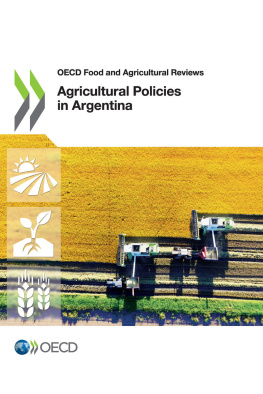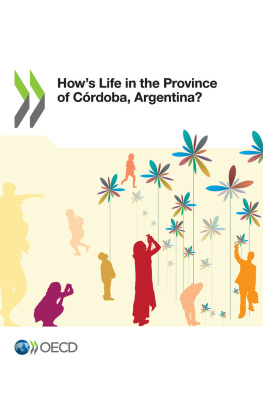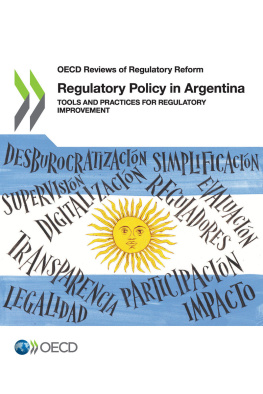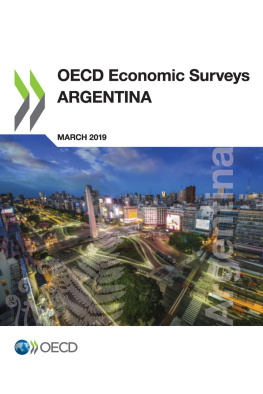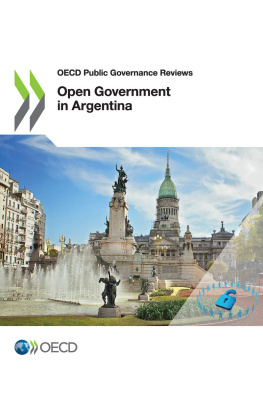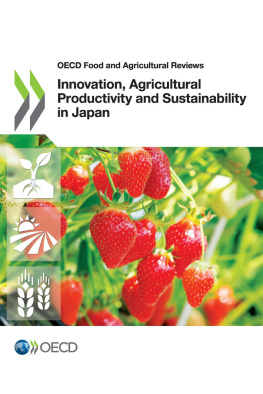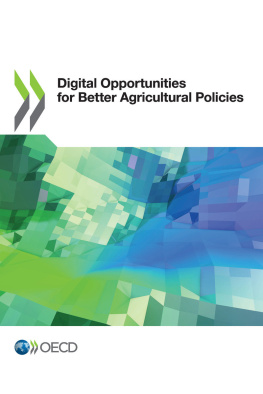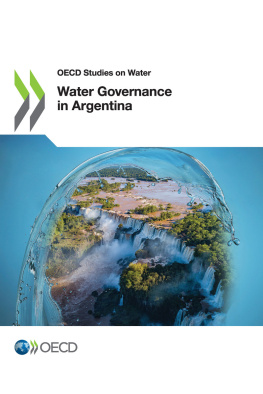OECD - Agricultural Policies in Argentina
Here you can read online OECD - Agricultural Policies in Argentina full text of the book (entire story) in english for free. Download pdf and epub, get meaning, cover and reviews about this ebook. year: 2019, publisher: OECD Publishing, genre: Politics. Description of the work, (preface) as well as reviews are available. Best literature library LitArk.com created for fans of good reading and offers a wide selection of genres:
Romance novel
Science fiction
Adventure
Detective
Science
History
Home and family
Prose
Art
Politics
Computer
Non-fiction
Religion
Business
Children
Humor
Choose a favorite category and find really read worthwhile books. Enjoy immersion in the world of imagination, feel the emotions of the characters or learn something new for yourself, make an fascinating discovery.
Agricultural Policies in Argentina: summary, description and annotation
We offer to read an annotation, description, summary or preface (depends on what the author of the book "Agricultural Policies in Argentina" wrote himself). If you haven't found the necessary information about the book — write in the comments, we will try to find it.
OECD: author's other books
Who wrote Agricultural Policies in Argentina? Find out the surname, the name of the author of the book and a list of all author's works by series.
Agricultural Policies in Argentina — read online for free the complete book (whole text) full work
Below is the text of the book, divided by pages. System saving the place of the last page read, allows you to conveniently read the book "Agricultural Policies in Argentina" online for free, without having to search again every time where you left off. Put a bookmark, and you can go to the page where you finished reading at any time.
Font size:
Interval:
Bookmark:
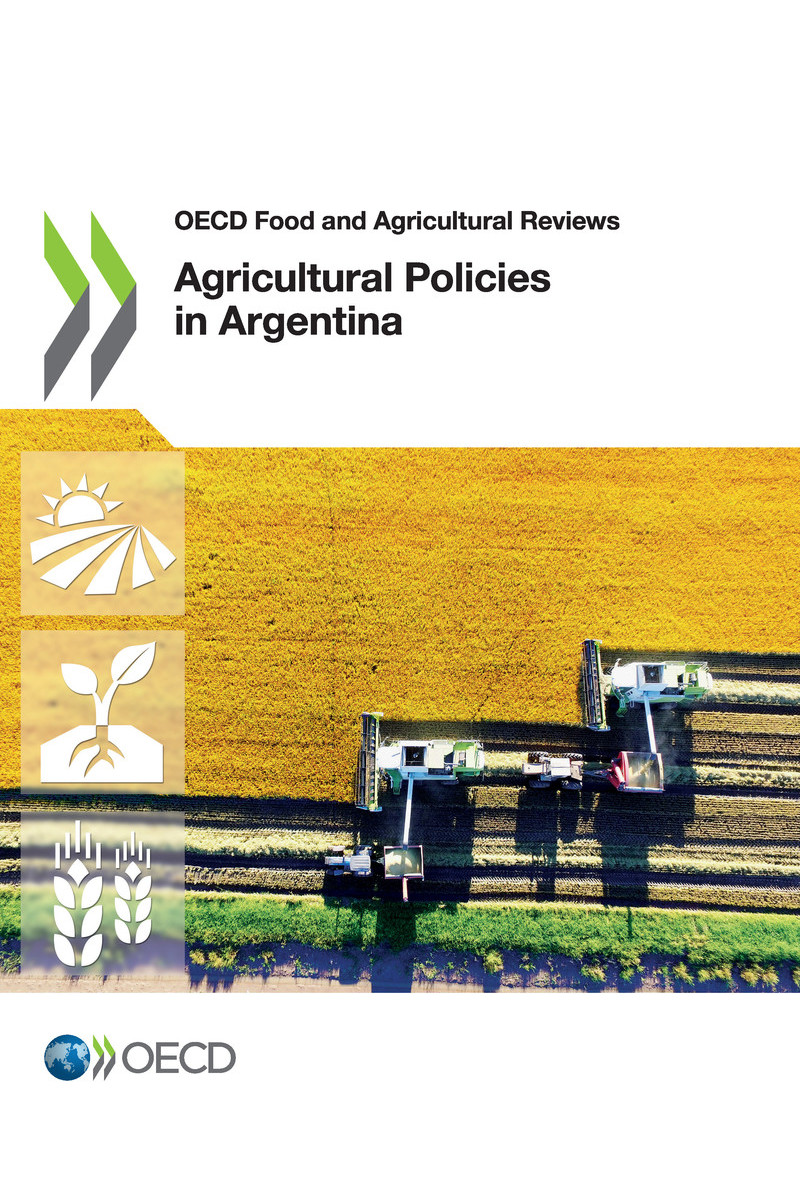
OECD (2019), Agricultural Policies in Argentina , OECD Food and Agricultural Reviews, OECD Publishing, Paris.
https://doi.org/10.1787/9789264311695-en
The Review of Agricultural Policies in Argentina is one in a series of reviews on national agricultural policies undertaken by the OECD Committee for Agriculture (CoAg). It has been prepared by the OECD Trade and Agriculture Directorate in collaboration with the Secretariat of Agroindustry of the Government of Argentina. The Review examines key trends and policy issues that have shaped the development of Argentinas agricultural sector over the last two decades and presents a quantitative evaluation of support provided through Argentinas domestic and trade policies. The Review classifies and measures the support provided to agriculture using the methodology that the OECD employs to monitor agricultural policies in all OECD countries and a growing number of non-member economies, including Brazil, the Peoples Republic of China, Colombia, Costa Rica, India, Indonesia, Kazakhstan, the Philippines, the Russian Federation, South Africa, Ukraine, and Viet Nam. The Review is the first step in the inclusion of Argentina in the annual OECD Agricultural Policy Monitoring and Evaluation report. The Review also features discussion of issues in the Argentine agriculture sector under the main areas of work of the CoAg, such as innovation, productivity, sustainability, risk management and value chains.
The OECD team for the Review comprised Jess Antn (project lead), Dalila Cervantes-Godoy, Santiago Guerrero and Florence Bossard [who undertook the Producer Support Estimate (PSEs) analysis]. The Argentine team in the Secretary of Agroindustry comprised Simona Paulero, Maximiliano Moreno, Gerardo Petri and Santiago Bonifacio. Additionally, valuable inputs were provided by Veronica Barrenechea, Norma Dobano, Alexandro Jara Podesta, Nicolas Lucas, Gisela Margot Mair, Consolacion Otao, Joaquin Daniel Perez Martin and Jose Posse, all from the Secretariat of Agroindustry in Argentina. The Review benefited from background reports from the following Argentinian experts: Esteban Barelli, Mercedes Ciampi, Miguel Fusco, Marcos Gallacher, Eduardo Trigo, and Daniel Lema, who also contributed to the PSE calculations. Anita Lari and Michle Patterson of the OECD provided publication support.
The OECD team also received inputs and contributions from Hubertus Gay, Catherine Moreddu, Urszula Ziebinska, and Karine Souvanheuane of the OECD Trade and Agriculture Directorate. Early drafts of the Review benefited from comments by Carmel Cahill, Ken Ash, Julia Nielson, Guillaume Grure, Franck Jesus, Vaclav Vojtech, Frank van Tongeren, Martin von Lampe (all from the Trade and Agriculture Directorate, OECD), Jens Arnold and Robert Grundke (from the Economics Department, OECD), Bert Brys (from the Centre for Tax Policy, OECD), and Richard Sigman (from the Environment Department, OECD).
The Review was discussed at the 171 th session of the OECD CoAg in November 2018. The Argentine delegation was led by Secretary of Government of Agroindustry Luis Miguel Etchevehere. Lead discussants for the report were Ms. Louise Van Meurs, First Assistant Secretary, Department of Agriculture, Australia; Esperanza Orellana, Director General of Production and Markets, Ministry of Agriculture, Fisheries and Food, Spain; and Rodrigo Vega, Agricultural Attach, Mission of Chile to the European Union. A first draft of the Review had previously been discussed on 31 July 2018 in Buenos Aires at a roundtable chaired by Santiago del Solar Dorrego, Chief of Staff of Agroindustry, with the participation of Argentinian officials as well as experts from the government, academia and the private sector.
The OECD is grateful to the Government of Argentina and Argentinian experts for their engagement and contributions throughout the review process.
Font size:
Interval:
Bookmark:
Similar books «Agricultural Policies in Argentina»
Look at similar books to Agricultural Policies in Argentina. We have selected literature similar in name and meaning in the hope of providing readers with more options to find new, interesting, not yet read works.
Discussion, reviews of the book Agricultural Policies in Argentina and just readers' own opinions. Leave your comments, write what you think about the work, its meaning or the main characters. Specify what exactly you liked and what you didn't like, and why you think so.

